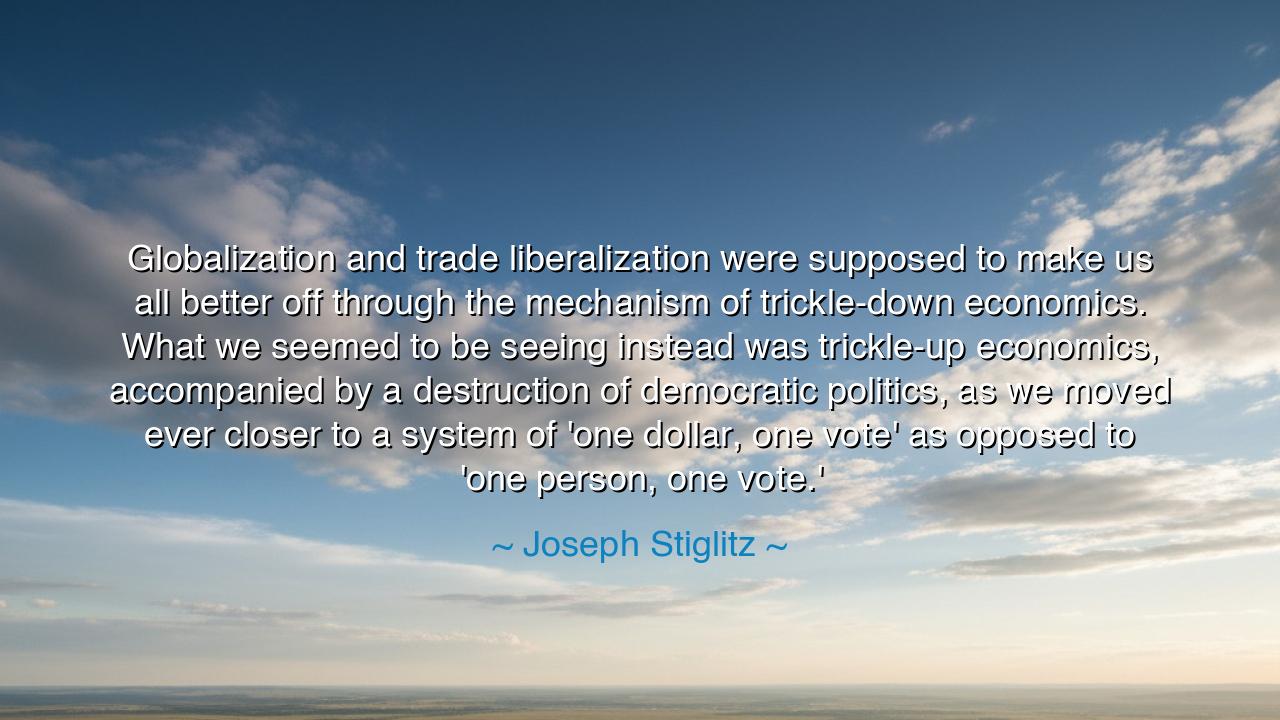
Globalization and trade liberalization were supposed to make us
Globalization and trade liberalization were supposed to make us all better off through the mechanism of trickle-down economics. What we seemed to be seeing instead was trickle-up economics, accompanied by a destruction of democratic politics, as we moved ever closer to a system of 'one dollar, one vote' as opposed to 'one person, one vote.'






The words of Joseph Stiglitz — “Globalization and trade liberalization were supposed to make us all better off through the mechanism of trickle-down economics. What we seemed to be seeing instead was trickle-up economics, accompanied by a destruction of democratic politics, as we moved ever closer to a system of ‘one dollar, one vote’ as opposed to ‘one person, one vote’” — resound like the cry of a prophet unveiling the illusions of an age. He speaks of promises betrayed: of systems that claimed to lift all, but in truth lifted only the few, leaving the many weakened. The wealth that was to descend like rain upon the people instead rose upward like mist, vanishing into the coffers of the powerful.
In these words lies a warning as old as empire: when wealth grows too mighty, it bends the instruments of power to its will. What was meant to be democracy — the rule of the people, each voice equal — becomes instead an oligarchy, where those with gold command louder voices than the multitude. Stiglitz strips bare the mask of trickle-down economics, showing it not as a river flowing to nourish all, but as a siphon drawing strength upward, away from the roots of society.
History shows us this pattern time and again. In the Gilded Age of America, the railroads, banks, and industrial giants amassed fortunes vast enough to bend governments to their desires. Laws were written not for the people, but for the magnates who could purchase influence. The cry of the workers, the sweat of the poor, seemed to count for little against the weight of the dollar. Yet from this darkness arose reformers, unions, and voices demanding that the nation return to the principle of one person, one vote. Thus, the struggle between money and democracy is no new tale, but an eternal contest.
The metaphor of “one dollar, one vote” is the ultimate corruption of the democratic dream. It is the shadowed mirror of liberty, in which equality is replaced by hierarchy, and the ballot becomes an auction. Stiglitz warns that when such a system takes root, politics itself withers, for the people grow disillusioned, and power becomes the possession of the wealthy few. In such a world, justice bows before profit, and the common good is forgotten.
Let future generations carry this wisdom: systems of globalization and trade are not evil in themselves, but when left unguarded, they serve the strong and abandon the weak. The task of every age is to bind wealth with chains of justice, lest it devour the very people it was meant to serve. For a nation’s greatness lies not in the riches of a few, but in the dignity of all its citizens. Only when democratic politics triumph over gold shall the promise of “one person, one vote” be fulfilled in truth.






AAdministratorAdministrator
Welcome, honored guests. Please leave a comment, we will respond soon